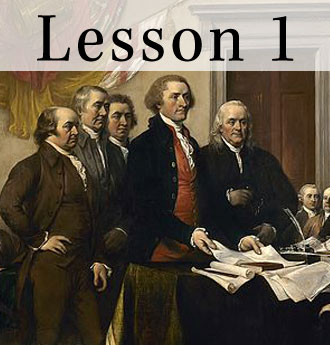The Resource Center » Level 3 » Unit 1 »
Lesson 1: What Did the Founders Think about Constitutional Government?

Lesson Purpose
This lesson introduces the basic ideas and experiences the founding generation drew on to create the kind of government they believed would best protect the natural rights of individuals and promote the common good. Classical Greek and Roman writers, natural rights philosophy, the Bible, Protestant theology, ancient and modern European history, and the Enlightenment in Europe and America were among the sources of the ideas that influenced the Founders. The Founders also participated in self-government in the American colonies before 1776 and in state and local governments after independence from Great Britain. The Founders' ideas about society and government and their experiences were diverse. The colonies differed widely. This diversity fostered a rich dialogue about the purpose of government and how it should be organized.
Lesson Objectives
When you have finished this lesson, you should be able to
- describe the diverse features of the early American colonies and states and their populations,
- explain what the Founders learned about government from history and their firsthand experiences of government and how this knowledge shaped their thinking,
- explain the meanings of the terms constitution and constitutional government and describe Aristotle's ideas about forms of government, and
- evaluate, take, and defend positions on how constitutional governments should be organized to prevent abuses of power by people in government.
Lesson Terms
constitution
A plan of government that sets forth the structures and powers of government. In democracies, a constitution is an authoritative law through which the sovereign people authorize a government to be established and grant it certain powers.
constitutional government
democracy
forms of government
limited government
mixed constitution
Parliament
republic
unwritten constitution
written constitution
Lesson Biographies
Cicero (106-43 BCE)
Marcus Tullius Cicero was an orator, a lawyer, a politician, and a philosopher whose life coincided with the decline and fall of the Roman Republic. Elected to each of the major offices in Roman government, including senator and consul, Cicero was exiled in 58 BC. During his eleven-year exile he wrote extensively about politics and philosophy, much of his work focusing on the defense and improvement of the Roman Republic. Cicero's De Officiis, a profound meditation on morality and moral duty, including moral principles as applied to public life, deeply influenced Western civilization since its writing in 44 BC. De Officiis was so influential that when the printing press was invented, it was the second book to be printed after the Bible. Cicero, echoing the views of Stoic philosophy, argued for self-restraint and limits to action for the sake of self-interest. He argued that what is honorable and what is expedient cannot ever rightly be said to conflict. What is honorable must always be chosen, and some actions, even to save the state, are so morally abhorrent that they must be rejected. In the sixteenth century Machiavelli directly contradicted these ideas and argued that to establish, maintain, and expand their power, rulers must be taught "how not to be good."
Aristotle (384-322 BCE)
Hobbes, Thomas (1588-1679 CE)
Locke, John (1632-1704 CE)
Montesquieu (1689-1755 CE)
Franklin, Benjamin (1706-1790 CE)
Blackstone, William (1723-1780 CE)
Mason, George (1725-1792 CE)
Adams, John (1735-1829 CE)
Jay, John (1745-1829 CE)
Hamilton, Alexander (1755-1804 CE)
Lesson Primary Sources
Treaty of Paris (1783)
The Treaty of Paris is an agreement signed on September 3, 1783, between Great Britain and the United States that ended the Revolutionary War. With the treaty, Great Britain recognized the independence of the United States. Also called the Peace of Paris.
De Officiis (On Moral Duties), by Marcus Tullius Cicero
Complete Works, by Montesquieu
Commentaries on the Laws of England (1765-1769), by William Blackstone
Declaration of Independence (1776)
A Modell of Christian Charity ("City Upon a Hill" sermon)--John Winthrop, 1630
Aristotle--Politics, 350 BCE
Montesquieu--The Spirit of Laws, 1748
Tocqueville--Democracy in America, 1835, 1840
Cicero--De re publica (The Republic or On The Commonwealth), 54-51BC
Pericles' Funeral Oration
United States Constitution






